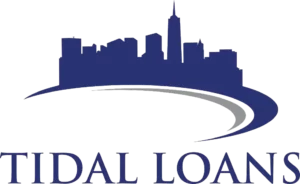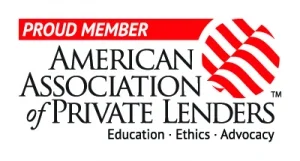Ever wondered why some businesses grow fast while others hit a wall? Getting a commercial loan can seem like a huge challenge. But, with the right help, your business can get the funds it needs to succeed.
Commercial loans can help businesses grow beyond their current limits. They can fund expansion, and new ideas, and keep the business running smoothly. Getting a loan might seem tough with all the options and strict rules. But, knowing what to do can make it easier.
To start, you need to know your business’s financial health. You must also meet certain requirements and prepare well for your loan application. At Tidal Loans LLC, we help businesses get commercial loans. We offer advice and make the application process simple.

Key Takeaways
- Commercial real estate loans can help businesses overcome cash flow limitations, enabling expansion and innovation.
- Most commercial lenders prefer businesses with at least two years of operational history and a credit score of at least 680.
- Loan applications often require detailed financial statements and evidence of consistent revenue.
- SBA loans come with lower down payment requirements but necessitate extensive documentation.
- Equipment financing and invoice financing have unique requirements and associated costs.
Want to learn more about getting a commercial loan and growing your business? Our detailed guide will show you how to navigate the process.
Understanding Different Types of Commercial Loans
Exploring commercial finance means looking at many options. Small business loans help with growth, buying equipment, or managing money. Here’s a quick guide to the main types.
Term Loans
Term loans give a big sum of money upfront. You pay it back over one to five years. They can have fixed or variable rates. This makes them flexible for many business needs.
Lines of Credit
Commercial lines of credit let you borrow as you need. You only pay interest on what you use. This is great for short-term needs and keeping cash flow steady.
SBA Loans
SBA loans, like the 7(a) and 504 programs, have good terms. They’re for businesses that might not get bank loans. They’re good for real estate, working capital, and growing your business. For tips on checking if a lender is real, see here.
Equipment Financing
Equipment financing lets you buy machinery without using all your money. The loan is secured by the equipment. This is great for businesses that need expensive tools.
Invoice Financing
Invoice financing helps with cash flow problems from slow payments. It advances money based on unpaid invoices. This keeps your business running smoothly, even with long payment terms.
Evaluating Your Business’s Financial Health
Before you start looking for commercial loans, it’s key to check your business’s financial health. You need to look at financial statements, understand credit scores, and figure out the debt-to-income ratio. This ensures your business can handle new debt well.
Reviewing Financial Statements
Looking at financial statements is the first step to checking your business’s health. You’ll need to look at the Balance Sheet, Income Statement, and Cash Flow Statement. The Balance Sheet shows your company’s liquidity and debt levels.
The Income Statement tells you about revenue growth and profit margins. It also shows if you can pay interest. The Cash Flow Statement shows where your cash comes from and how liquid you are.
Important metrics include debt-to-equity ratio and return on assets. Comparing these ratios to competitors over time gives you a clear view of your business’s health.
Importance of Credit Scores
Credit scores are key when it comes to getting a loan. Scores range from 300 to 850, with higher scores meaning less risk. Lenders usually want scores of 680 or higher for good loan terms.
It’s important to check both personal and business credit history. A good credit history can lead to better loan terms and rates.
Debt-to-Income Ratio
The debt-to-income ratio (DTI) shows how much debt you can handle. It’s your total monthly debt payments divided by your monthly income. Lenders look at this ratio to see if you can take on more debt.
Keeping your DTI ratio low shows you’re less likely to default on a loan. This makes it easier to get approved and shows you can handle new financial responsibilities.
By carefully reviewing financial statements, checking credit scores, and calculating the debt-to-income ratio, you’re ready for the loan application process. Working with financial experts, like those at Tidal Loans LLC, can make this easier and help you get a successful commercial loan.
Preparing Essential Documentation
Getting a commercial loan means you need the right documents. They show your business’s financial health and your professionalism. Let’s look at the important documents you’ll need.
Business Financial Statements
Your business financial statements like profit & loss and balance sheets are key. They show your business’s income and spending. Lenders often ask for three months of bank statements and a debt schedule.
Tax Returns
Lenders want to see your personal and business tax returns for the last two years. They check if you’re making money and if you’re up to date on taxes.
Business Plan
A good business plan is crucial. It explains your goals, how you plan to achieve them, and your financial outlook. It should also have cash flow forecasts to show your business’s future health.
Legal Documents
Your legal documents are important too. They include business licenses and incorporation papers. These prove your business is real and follows the law.
Personal Financial Statements
Lenders also look at your personal finances. They want to see your credit history and any liquid assets. This shows you can pay back the loan.
How to Get a Commercial Loan
To get a commercial loan, you need to understand the process. This means knowing the different loans, checking your finances, gathering documents, and picking the right lender.
Businesses get loans for many reasons. They might want to grow, enter new markets, buy equipment, or pay off debts. The process can seem hard, but breaking it down helps.
Reviewing Financial Health
Checking your finances is key. Look at your financial statements and credit scores. Lenders also care about your debt and cash flow. They might ask for financial records from the past few years.
Preparing Necessary Documentation
Getting your documents right is important. You’ll need financial statements, tax returns, and a business plan. A good business plan shows you’re ready for the loan.
Identifying Loan Requirements
Know what loan you need. Loans for buying businesses are different from those for equipment. Choosing the right loan is crucial.
Finding the Optimal Lender
There are many lenders out there. Banks, non-bank lenders, and online options each have their benefits. SBA loans, for example, offer good terms because they’re backed by the government. Specialized banks like Texas Security Bank can also offer custom loans.
Getting a commercial loan is more than just applying. By understanding the process and preparing well, your business can get the funds it needs. Whether it’s for buying a business or other needs, being ready and knowing the market can help a lot.
Identifying Your Loan Requirements
When you apply for a commercial loan, it’s key to know what your business needs. This could be for growth, managing money, buying equipment, or getting working capital. Knowing this helps you pick the best loan and prepares you for the process.
Business Expansion
Expanding your business needs a good plan and lots of money. You might need to open new places or buy more property. Choosing the right commercial real estate loans is crucial for growth. Lenders often ask for a business plan to check if you qualify.
National Funding offers loans up to $500,000. This gives you the flexibility you need for growth.
Cash Flow Management
Keeping a steady cash flow is essential for any business. Sometimes, you need working capital loans to handle daily costs. The United States Small Business Association (SBA) says 27% of businesses struggle with cash flow.
These loans help keep your business running smoothly.
Equipment Purchase
Buying new equipment can be expensive. It might be for new tech, machinery, or more products. An equipment purchase loan can help with the cost.
Industries like transportation, hospitality, and healthcare often use these loans. It’s important to think about the long-term benefits of these investments.
Working Capital
Working capital loans help with daily costs and unexpected expenses. Lenders look at your cash flow, including rental income. A good debt-to-income ratio and steady net income can help you get approved.
Businesses might use other assets as collateral or get cosigners to strengthen their application. Tidal Loans LLC can help find the right loan for your needs.
Finding the Best Lender for Your Needs
Finding the right commercial loan depends on picking the right lender. There are many options, from traditional banks to online lenders. Each has its own benefits and things to consider.
Traditional Banks
Many business owners start with traditional banks. They offer big loans and follow set rules. For example, banks might ask for up to 20% down payment.
They like assets that grow in value, like real estate. U.S. Bank and JPMorgan Chase are well-known in this field. U.S. Bank is even an SBA Preferred Lender.
Non-Bank Lenders
Non-bank lenders offer more flexibility. They can finance without a down payment and approve loans quickly. This makes them great for businesses with unique needs.
Team Financial Group is a good example. They finance assets that lose value, like IT equipment. Non-bank lenders like RCN Capital and 1West also offer low rates and long terms.
Online Lenders
Online lenders are big in today’s world. Sites like Lendio connect businesses with many lenders. This means you can find many options with just one application.
Online lenders are good for quick financing or alternative loans. Companies like Lima One Capital and SMB Compass offer big loans and good rates. They’re great for different financing needs.
Choosing the right lender is key to getting a commercial loan. Knowing what each type offers helps match your needs with the best lender.
Steps to Submit a Successful Loan Application
Getting a commercial loan takes several important steps. You need to complete the application form correctly, submit documents on time, and work well with lenders. Each step needs your full attention and effort.
Completing the Application Form
Start by completing the application form with care. Giving accurate and detailed info boosts your approval chances. Banks look for credit scores of 690 or higher. Online loans might be easier to get with a lower score.
Make sure you meet the lender’s minimum requirements for business history and revenue.
Submitting Necessary Documents
Then, focus on submitting documents quickly. You’ll need financial statements, tax returns, business plans, legal papers, and personal financial info. Your business’s financial health is key, aiming for a debt service coverage ratio of 1.25 or more.
For SBA loans, a Small Business Scoring Service (SBSS) score of at least 155 helps a lot.
Working with Your Lender
Lastly, success in getting a loan depends on working well with your lender. Good communication and quick answers to questions make things easier. Services like Tidal Loans LLC can help with this, from completing forms right to talking to lenders.
Following these steps makes the application process smoother. It brings you closer to getting the funding your business needs to grow.
Common Challenges and How to Overcome Them
Getting a commercial loan can be tough due to many challenges and financial hurdles. But, knowing the common problems and finding smart solutions can help a lot. This can make your loan application more likely to succeed.
First, strict rules can stop new businesses from getting loans. Banks often don’t lend to companies that are less than two years old. They also want a debt service ratio of at least 1.25 for approval. But, working with alternative lenders or SBA loans can offer good options.
Another big problem is dealing with lots of paperwork. Businesses need to show detailed financial statements, tax returns, legal papers, and a solid business plan. Mistakes in these documents can be high, up to 10%. Using loan management software can help make things more accurate and less error-prone.
The world of commercial lending is varied, and finding the right loan is key. For example, banks usually want a personal credit score over 700 for small business loans. They also like a debt-to-credit ratio under 30% for approval. But, Honeycomb Crowdfunded loans don’t need collateral or prior investment, and they look at a broader range of credit scores.
Businesses in risky sectors like restaurants and consumer goods face extra challenges. Banks see these industries as high-risk, making it harder to get loans. Luckily, Honeycomb has helped businesses in these areas get funding. They offer a quicker and more flexible option than traditional loans.
To tackle these issues, businesses need to be proactive, well-informed, and flexible. Getting advice from experts like Tidal Loans LLC, preparing carefully, and looking into non-traditional loans can help. This way, businesses can face the complex world of commercial lending with more confidence and success.
Conclusion
Getting a commercial loan is a detailed process. It needs careful planning and a good understanding of different loans. Businesses must also prepare well to meet lender needs.
By checking the business’s financial health and getting all necessary documents ready, businesses can find the right loan. They should also know what lenders want and choose the best one. Overcoming common hurdles is key to getting the financing needed for growth.
Knowing about financing options like lines of credit and term loans is vital. Traditional lenders look for collateral, a good debt-to-income ratio, and positive cash flow. Keeping financial records up to date and offering personal guarantees can help too.
This guide has shown that careful preparation is crucial for commercial financing success. If you’re struggling, Tidal Loans LLC can help. They offer expert advice at every step to support your business goals. For more help, contact Tidal Loans LLC.


